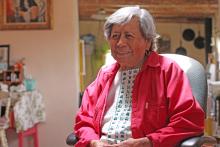
Born: 1930 in Cheraw, Colorado
Enriqueta Vasquez was born in 1930 in Cheraw, Colorado to a large family near the farm labor camps. Her parents were very political, and her mother was a curandera and midwife for the community. Her first experiences with racism took place at school: all the Mexican American children were segregated to one room and taught by only one teacher. The students were punished for speaking Spanish and there were separate swings for the Mexican American and Anglo children. But Enriqueta found her activist voice at a young age. In the fourth grade, she recalls speaking up during a history lesson on the U.S. Southwest: “I remember I raised my hand right away [and said], ‘My mother said that they stole all that land from Mexico!’”
After her high school graduation, Enriqueta moved to Denver, where she met famous Chicana/o movement activist Corky Gonzales. She attended night school and went on to work with the U.S. attorney’s office in the 1950s as the only and first Mexican American in the Justice Department. There, she made a point to assign sympathetic and fair judges to the Chicana/os that would go on trial. During this time, she also met her first husband and had two children, but her husband became violent towards her. In 1960, when her now ex-husband attacked her at home, she quit her job and left with her two children to start her life over in California.
A few years later, Enriqueta returned to Denver and began organizing with the GI Forum. She also became assistant director of SER (Service, Employment, and Redevelopment), an organization that helped Chicana/os get jobs and defend their workers’ rights. Always politically active, Enriqueta also helped Corky Gonzales run for mayor of Denver. During this time, she was one of only two women to help picket the Rocky Mountain News newspaper for running a racist article against Mexican Americans. Later, she recalls bringing her young nieces with her to learn how to picket. Through her organizing work in Denver, she met her eventual husband Bill Longley — but this time, she would not take her husband’s last name. Enriqueta kept her maiden name, Vasquez, and both she and Bill began signing their name “Longeaux y Vasquez.”
In 1966, at Corky Gonzales’ request, she and Bill moved to San Cristobal, New Mexico to help run the Vincent Ranch. The Vincent Ranch was an extension of the Denver-based Escuela Tlateloco, and Chicana/o children from the inner-city were taught wilderness survival skills and farm work there. During this time, Enriqueta founded and started publishing the landmark movement newspaper El Grito del Norte with Betita Martinez and a team of local activists. Enriqueta became especially well-known for her column, “Despierten! Hermanos” [Wake Up! Brothers]. The newspaper covered many subjects, including what was happening in the Chicana/o movement — Reies Lopez Tijerina’s land grant movement and Corky Gonzales’ organizing in Denver, especially — as well as articles in solidarity with U.S.-based, international, and Third Worldist movements.
However, El Grito del Norte and Vincent Ranch attracted the attention of local and federal law enforcement, who claimed that the activists training guerillas at the ranch. Enriqueta recalls being tailed by police the whole 60 miles between San Cristóbal and Española, where they would publish the paper. Further, Vincent Ranch’s library was burned down in 1969. Enriqueta recalls how she and her friends distanced themselves from their families out of fear for their safety — especially when the far-right organization the John Birch Society leaked everyone’s names, phone numbers, car makes and models, license plate numbers, “Everything. We knew we were being watched all the time. But it’s just one of those things, figure, what can we do?”
Enriqueta’s journalism work also took her all over the U.S. and the world, including Cuba and China. In 1969, the Cuban government invited Enriqueta and other journalists from around the world to report on the Cuban revolution’s ten-year anniversary. She was amazed at the racial desegregation taking place in Cuba, where black musicians and white musicians played on the same stage together. It was then she realized how “brainwashed” U.S. Americans were about race. She also became a strong advocate of Cuba and of socialism, which she felt provided food, education, and livelihood and reduced inequality.
In the late 1970s, she went back to school at the University of New Mexico, but was advised against pursuing a master’s. Sensing racial bias behind that advice, Enriqueta says, “That’s why we need Chicana/o clubs, to encourage people to keep going on.” Despite her enormous organizing experience and historical knowledge, including the compilation of several books on Chicana women and La Raza, she never taught a college class. However, she has continued to be an active community member, organizer, and artist. Enriqueta cofounded the organization Hembras de Colores to celebrate Cinco de Mayo and put on cultural art shows and high school poetry contests. She has also continued her career as an accomplished writer and painter, and has created beautiful murals in El Prado, Albuquerque, and her own home, including one titled El Puño de Tierra.
Throughout her life, Enriqueta has also explored her indigenous roots as a Chicana. Asked how she understands her relationship to indigeneity, she says, “We’re Chicanos, we are mestizos. We do have indigenous roots… We’re not pure European. Somos mestizos.” Her journey began by attending sun dances and listening to American Indian activist speakers such as Black Elk and Crow Dog. Over time, she grew into a role as a community grandmother and elder. In retrospect, Enriqueta understands that her mother was the first person to teach her indigenous medicine and knowledge through her experience as a curandera and midwife.
Enriqueta’s advice for readers today is to keep up with what’s going on and get involved locally in your own community. She asks us to do whatever you can do, to express yourself creatively, and ultimately, to “Just keep going.”
